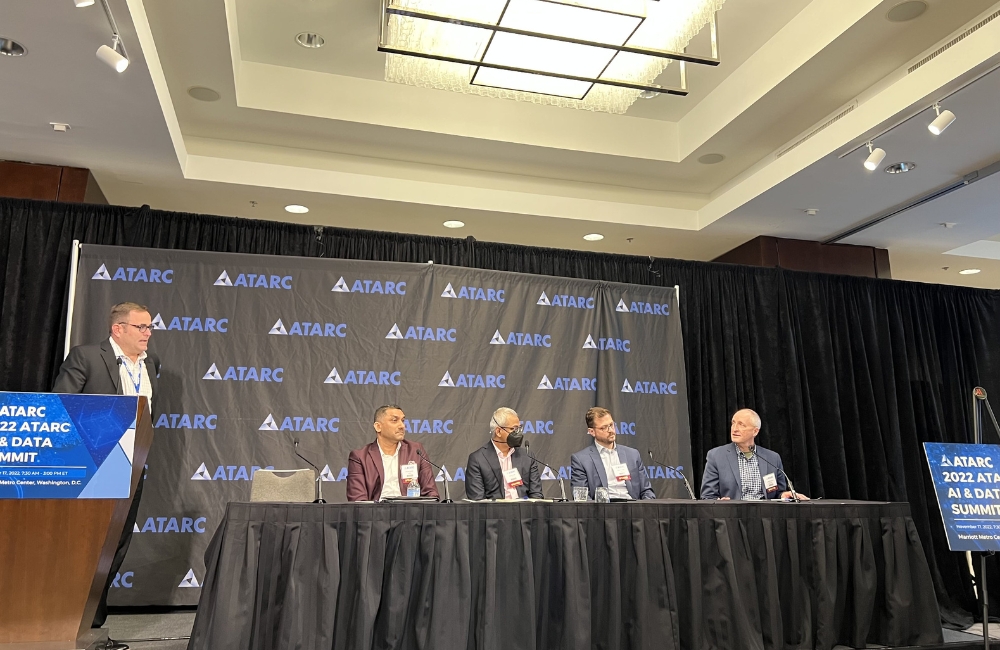Pentagon to Bring AI to Combatant Commands Next Year
The Pentagon’s Chief Digital and AI Office will focus on enabling AI at the combatant command-level in 2023.

The Pentagon’s Chief Digital and Artificial Intelligence Office (CDAO) will focus on enabling AI tools for combatant commands next year, according to CDAO Chief Technology Officer William Streilein at ATARC’s Federal AI & Data Summit yesterday.
While the military services are already adopting AI capabilities, the combatant commands need help leveraging the services’ capabilities to enable the joint force.
While there are teams of experts available within the Defense Department to help combatant commands deploy AI, the CDAO wants the commands to be able to organically identify, develop and deploy their own capabilities to help transform how they pursue their missions.
“I don’t want to say [the combatant commands are] left behind, but [they] are basically in need of transforming, and so what we’ll be able to talk about next year is some strides there,” Streilein said Thursday.
The CDAO was formed out of four previously-existing organizations responsible for AI and data within DOD: the JAIC (Joint Artificial Intelligence Center), the Chief Data Office, the Defense Digital Service (DDS), and ADVANA, a data analytics platform. The goal of joining these four organizations together was to streamline DOD’s efforts to accelerate transformation related to data, AI and analytics. The CDAO reached full operating capability in June 2022 and will spearhead all AI and data-related initiatives moving forward.
“The goal is not to create one monolithic system for all of DOD but to federate, to enable systems that already exist to share data and work across each other,” Streilein said.
To be AI-ready by 2025 and AI-competitive by 2027, and before the department can leverage analytics and AI, leadership needs to focus on quality data, according to Streilein.
“We have to get our data in order because the data will supply you the fuel, if you will, for the analytics,” Streilein said.
The culture around data and teaching best practices is just as crucial as quality data, he added, echoing comments from other data leaders across the defense community.
“Teaching best practices related to data – that is probably the most important thing… Data gets created all the time. And it’s just so easy to treat it and not put the right labels on it,” Streilein said.
To achieve that goal and become data-centric, all the data needs to get to a place where it is VAULTIS, or visible, accessible, understandable, linked, trustworthy, interoperable and secure.
“If you can make your data VAULTIS then you are hopefully AI-ready. That’s great if you can say your new data’s VAULTIS, then you’re not creating new bad, and you’re moving things forward, and so incrementally we’re getting there,” Streilein said.
This is a carousel with manually rotating slides. Use Next and Previous buttons to navigate or jump to a slide with the slide dots
-

Generative AI Demands Federal Workforce Readiness, Officials Say
NASA and DOI outline new generative AI use cases and stress that successful AI adoption depends on strong change management.
6m read -

The Next AI Wave Requires Stronger Cyber Defenses, Data Management
IT officials warn of new vulnerabilities posed by AI as agencies continue to leverage the tech to boost operational efficiency.
5m read -

Federal CIOs Push for ROI-Focused Modernization to Advance Mission Goals
CIOs focus on return on investment, data governance and application modernization to drive mission outcomes as agencies adopt new tech tools.
4m read -

Fed Efficiency Drive Includes Code-Sharing Law, Metahumans
By reusing existing code instead of rewriting it, agencies could dramatically cut costs under the soon-to-be-enacted SHARE IT Act.
5m read -

Agencies Push Data-Driven Acquisition Reforms to Boost Efficiency
New initiatives aim to increase visibility of agency spending, improve data quality and create avenues to deploy solutions across government.
5m read -

Data Transparency Essential to Government Reform, Rep. Sessions Says
Co-Chair of the Congressional DOGE Caucus Rep. Pete Sessions calls for data sharing and partnerships to reduce waste and improve efficiency.
5m read -

AI Foundations Driving Government Efficiency
Federal agencies are modernizing systems, managing risk and building trust to scale responsible AI and drive government efficiency.
40m watch -

Navy Memo Maps Tech Priorities for the Future Fight
Acting CTO’s memo outlines critical investment areas, from AI and quantum to cyber and space, as part of an accelerated modernization push.
5m read -

DOD Can No Longer Assume Superiority in Digital Warfare, Officials Warn
The DOD must make concerted efforts to address cyber vulnerabilities to maintain the tactical edge, military leaders said at HammerCon 2025.
4m read -

New NSF Program Cultivates the Future of NextG Networks
The agency’s new VINES program looks to tackle key challenges like energy efficiency and future-proofing wireless tech.
21m watch -

DHA CDAO Spearheads Master Data Catalog to Boost Transparency
Jesus Caban plans to boost DHA's data maturity through a new master data catalog, governance frameworks and inventory of tech tools.
5m read -

Trump Orders Spark Government-Wide Acquisition Overhaul
As Trump pushes for a faster, simpler procurement system, agencies are leveraging AI and adapting strategies to meet new requirements.
5m read




